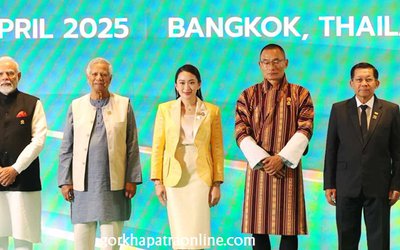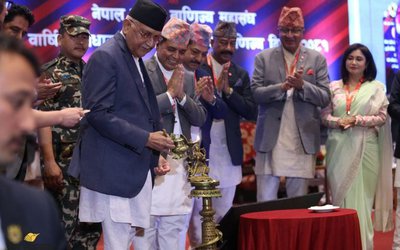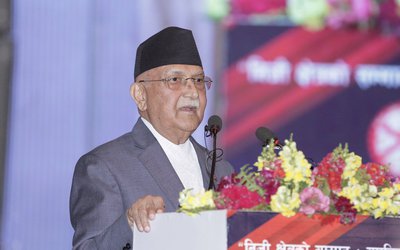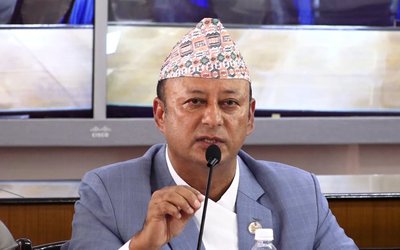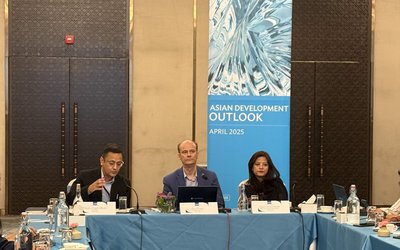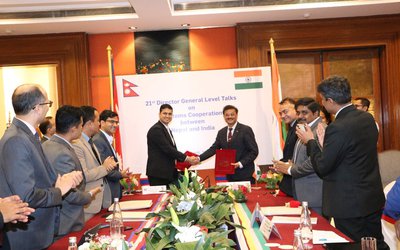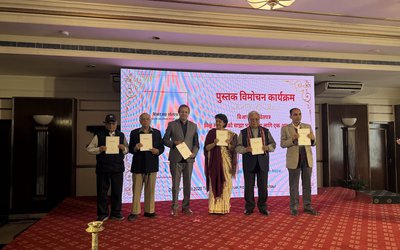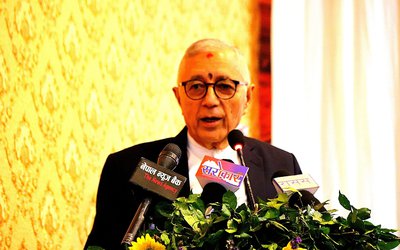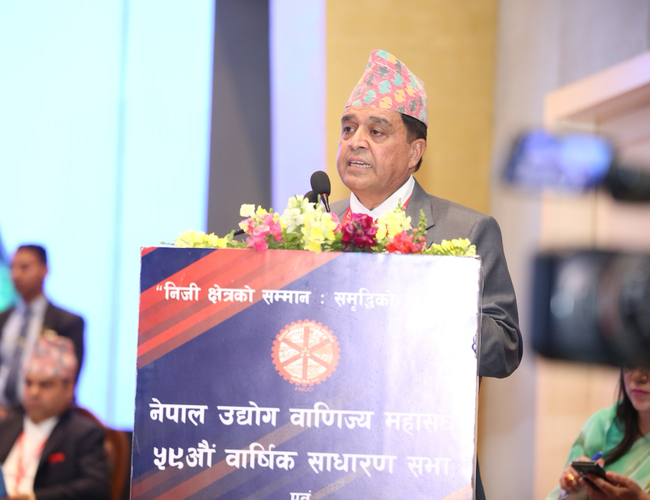
I extend a warm welcome to all of you to the opening event of the 59th Annual General Meeting of the Federation of Nepalese Chambers of Commerce and Industry and the Industry and Commerce Day 2081. Today signifies the conclusion of the current Executive Committee's two-year term.
Today marks the completion of two years since the current Executive Committee of the Federation took office. During this time, we have worked to turn challenges into opportunities, seek out new possibilities, overcome setbacks, and achieve success in various areas. Our efforts to bring about reform are ongoing.
I would like to recall that two years ago, during the inaugural ceremony of the 57th Annual General Meeting of the Federation, there was much discussion about the risk of Nepal facing an economic crisis similar to that of Sri Lanka. While many speakers warned of the potential for Nepal to encounter foreign exchange issues like Sri Lanka if timely action was not taken by the government, I expressed my belief in my closing remarks that Nepal would not follow the same path as Sri Lanka.
There were valid reasons for this, such as Nepal opting for concessional loans, with the credit to GDP ratio being less than 40 percent. Additionally, foreign exchange reserves were adequate to cover over 6 months of imports of goods and services.However, we became overly cautious and implemented more measures than necessary, leading to a loss in revenue. This resulted in a shift from formal to informal trade channels, with informal imports becoming the norm, except for cars and motorcycles. The policy decisions made to control market demand have hindered market functionality to this day. Despite efforts, the economy only grew by 5 percent in the last quarter, as reported by the National Statistics Office. A survey conducted with approximately 240 organizations nationwide revealed that entrepreneur morale has not improved. We will release this report soon. Personally, I am an entrepreneur who seeks balance amidst challenges.
I aim to inspire hope, not despair. While there have been some improvements, they are not sufficient to meet the aspirations of our youth. Without the creation of quality, well-paying job opportunities within the country, despair will persist. The current sense of hopelessness stems from this issue. We understand that the government has limitations in job creation, and it has managed to provide employment to around half a million individuals.
The private sector, which employs 86 percent of the population, also plays a crucial role. However, Nepal's private sector lacks the capacity to absorb the approximately 500,000 young people entering the labor market annually. Consequently, many youths are seeking opportunities abroad for employment. The situation in Nepal and the economies that employ Nepalis were comparable in the past. In the 1960s, Nepal's per capita income was $50, while South Korea's was around $100.
Currently, Korea's per capita income stands at $40,000, while Nepal's is at $1,400. Over time, Korea's income has grown by 400 times, and Nepal's by 28 times. However, the purchasing power of $40,000 and $1,400 are not comparable. Progress has been made, but not to the extent that was hoped for.
Globalization has not only increased the needs and aspirations of ordinary people, but has also exposed the entire world to a standard of living and work that aligns with our capabilities. While we have been able to secure employment in larger economies, we have not been able to elevate our own economy to a similar scale.
Bangladesh's per capita income is twice that of Nepal, with total exports exceeding $40 billion. Despite being on the verge of being upgraded from a least developed country status, Nepal has not yet reached this level of income. Progress has been made in other areas, but in order to avoid regression, it is crucial to allow the private sector to operate freely. I would like to discuss what can be done, how it can be achieved, and the necessary support from stakeholders, including the government.
Dear Prime Minister, the primary goal of the current government is to create a prosperous Nepal and ensure the happiness of its citizens. Prosperity entails providing opportunities for all individuals, which requires investments in money, intelligence, wisdom, and skills. Initial financial investments are crucial, followed by the need for labor and skills during the production process.
There are two main entities that provide funding for investments: the government and the private sector. The government typically generates investment funds from revenue collected from entrepreneurs, businesses, and the general public. The private sector, which is responsible for creating the majority of jobs, also serves as a significant source of income for the general public.
A recent study conducted by the International Finance Corporation and the Federation of Nepalese Chambers of Commerce and Industry revealed that the private sector contributes 81 percent to the economy. Therefore, it is crucial to prioritize the freedom of operation for the private sector in order to achieve the government's goal of prosperity.
A key factor in the well-being of individuals is access to sufficient employment and the resulting income. When individuals are able to meet the basic needs of their families, including education and healthcare, it contributes to their overall happiness. I call upon all stakeholders, including government entities, civil society, and the media, to recognize the importance of the private sector in achieving these goals.
Countries that have grasped this concept have experienced significant advancements. For instance, Bangladesh, Rwanda, Cambodia, Vietnam, and Laos, countries that were once similar to us, have now surpassed us in terms of progress. The private sector's increased involvement has contributed to a 1.4 percent annual decrease in poverty in India. Over the past two decades, approximately 500 million individuals have been lifted out of poverty.
Bangladesh, a country similar to ours, has witnessed its exports increase from $18 billion to $40 billion since 2010. Rwanda, which endured the loss of 800,000 lives due to internal conflict in just 100 days three decades ago, has achieved an economic growth rate of 7.2 percent over the last 20 years. Cambodia, which became a member of the World Trade Organization at the same time as us, has attracted ten times more foreign direct investment than Nepal. If these nations can achieve such progress, why can't we?
If others are making progress, why are we lagging behind? These issues must be addressed. Respected Prime Minister, Ministers, Chief Secretary, Secretaries, and esteemed guests, I want to emphasize that we have the potential to move forward. Let's focus on foreign investment, which currently stands at only 0.2 percent of the GDP, approximately 8 billion rupees per year. We can easily increase this amount fivefold.
Our goal should be to attract one billion dollars in foreign investment annually by 2030. I have cited the example of Cambodia, a fellow member of the World Trade Organization, to illustrate the potential for growth. Over the past two years, we have organized four conferences in India, China, and the UAE, with over 150 local entrepreneurs participating in each event. They are keen to invest in Nepal. The current global economic landscape also favors Nepal, as the US has imposed lower customs tariffs on Nepali goods compared to its competitors, creating opportunities for increased investment. We must capitalize on this advantage. Our team is actively researching this opportunity.
In addition to promoting investor morale in the country, the Federation has launched a campaign to mobilize domestic capital, involving FNCCI, CNI, Chambers, District Chambers of Commerce and Industry, businessmen in commodity associations, non-resident Nepalis, and all other institutional and individual entrepreneurs, businessmen, and investors. As a result, the Nepal Development Company has been established. This company aims to create investment opportunities in large projects by aggregating small capital from all 77 districts of the country and abroad. Despite the current challenges, we believe that reform is achievable. We have successfully resolved significant internal conflicts and recovered from a devastating earthquake. By promulgating the constitution through consensus, we have taken steps towards stability. While facing challenges such as the Covid pandemic, we remain committed to addressing current issues. Despite our economic challenges, we are resourceful entrepreneurs who prioritize the economy. It is crucial to ensure that entrepreneurs can operate without hindrance.
I reiterate that we are capable of achieving economic growth. If we do not take action, who will? From 2073 to 2075, there was an average economic growth of over 7.5 percent due to political stability and its positive message. We urge all political parties to come to a common understanding on economic issues. A shared understanding among political parties on the economy, development, and prosperity is essential. Political leaders should refrain from actions that harm private sector businesses and the livelihoods of ordinary people.
The private sector has the potential to generate capital amounting to Rs. 1.6 trillion annually, with the government only needing to invest Rs. 4 trillion. Achieving double-digit growth is feasible, and millions of jobs can be created each year. The key prerequisite for this is stability. These matters have been deliberated in the High-Level Reform Suggestion Commission established for economic reform. We have been analyzing and discussing the presented statistics and reform proposals for the past two years. On October 25, 2080, we held a significant economic conference advocating for a new phase of economic reforms and the establishment of a high-level commission for this purpose. With the commission now in place, we are finalizing our recommendations.
Another essential factor for implementing reforms that have a tangible impact on the general population is the presence of good governance. The issue of good governance has been a significant challenge in the country for the past three decades. It is a shared concern for all of us. Nepalis are inherently a simple, content, sociable, and supportive community.
Their needs are modest. However, societal dynamics are gradually evolving, making it increasingly challenging to lead a simple and uncomplicated life. Failure to establish good governance could lead to not only economic challenges but also societal issues. Prime Minister, Ministers, Chief Secretary, our requests are modest, and your minor efforts in this regard will be greatly appreciated. Let's create an environment where aspiring youth can easily find opportunities for employment. Let's uplift the spirits of entrepreneurs who invest in the country. Let's provide reassurance to individuals seeking security and encourage them to contribute to society. Let's offer words of appreciation to taxpayers and avoid undermining the private sector, which plays a crucial role in job creation.
These are not major requests, but they have the potential to create a significant impact. Utilizing technology and implementing ethical policies effectively can lead to substantial changes. The development of artificial intelligence is poised to revolutionize the world. We are advocating for broad reforms, encompassing everything from business registration to citizen engagement through apps. It is crucial for the government to take the lead in this initiative, with potential involvement from the private sector and donor agencies.
Another key aspect of improving governance is the promotion of ethics. The legal framework should be designed to foster good governance, as past laws have sometimes led to increased distrust. The policies, programs, and budget of the current fiscal year should serve as a foundation for reform efforts. There is a lot that can be achieved in this regard. Esteemed Prime Minister, distinguished guests, it is widely recognized that the private sector's challenges have had far-reaching effects, including on government revenue. It is time for the private sector to drive economic growth and development, reducing competition for resources. Let us collaborate on a plan to move forward together.
Let's explore opportunities for collaboration with local and provincial governments. The role of donor agencies may not be the same as before. We need to analyze and discuss ways to enhance the effectiveness of our institutions from the central to the local level. Strategic plans have been developed, and it is essential to establish innovative thinking centers at all levels.
I encourage everyone to embrace the slogan of respecting the private sector, which is the cornerstone of prosperity. Despite providing 86 percent of employment, the private sector is often undervalued. It contributes over 80 percent of direct and indirect revenue but is frequently overlooked.
The private sector, responsible for 81 percent of investments, is consistently at risk. Despite accounting for 98 percent of exports, it faces constant challenges and disrespect.
We take risks, invest significantly, and contribute to revenue and employment, yet our morale suffers due to ongoing insecurity. This is why we have emphasized the importance of security, respect, and dignity. State investment is not the solution; rather, what is needed is harmony. I am pleased that the Honorable Prime Minister has shown a positive attitude towards addressing these issues.
We also recognize the importance of respecting others in order to earn respect ourselves. It is crucial to be mindful and accountable towards consumers and other stakeholders, and to show appreciation for those who work diligently in these areas. In response to our requests, the government, including the Honorable Prime Minister, has made amendments to approximately 35 laws. Additionally, a draft of a bilateral investment agreement has been prepared. The Ministry of Commerce has decided to transition the Certificate of Origin process to a fully online platform in response to our call for transparency and accountability.
We are activelypromoting Nepal through programs organized abroad. A high-level commission has been established at our request to lay the groundwork for a new phase of economic reform. I extend my gratitude to the Honorable Prime Minister, Ministers, Chief Secretary, Government, and all political parties and leadership for their support in these efforts.
I encourage members of the Federation to take ownership of and advocate for the ongoing reform initiatives, as they were initiated based on the Federation'ssuggestions and requests. Let us all work together to support these reforms at all levels, from the central government to local communities.
This reform involves changes in policy and regulations. It focuses on procedural improvements, behavioral changes, and shifts in work and thinking. It encompasses reforms at various levels of government, including the center, state, municipality, and ward levels. The reform aims to enhance social services such as education and health, as well as improve the conduct and practices of businesses. It is essential for the well-being of current and future generations. All levels of the federation must be engaged in enhancing the policy-making process by considering local needs and global trends. It is imperative that we do not remain underdeveloped and mired in poverty and deprivation.
Finally, I extend a warm welcome to the Honorable Prime Minister, Honorable Ministers, Members of Parliament, Chief Secretary, Secretaries, and all the esteemed guests present at the 59th Annual General Meeting of the Federation of Nepalese Chambers of Commerce and Industry and the 2081st Industry and Commerce Day. On behalf of the Federation of Nepalese Chambers of Commerce and Industry and personally, I am delighted to have you here.
As we gather on the occasion of the New Year 2082, I send my sincere wishes for a prosperous and joyful year ahead for you and your loved ones. May the coming year bring success to our collective efforts to transform challenges into opportunities and despair into hope.
Dhakal serves as the president of the Federation of Nepalese Chambers of Commerce and Industry (FNCCI). The following are excerpts from his address at the opening ceremony of the 59th Annual General Meeting held on April 10, 2025.
- Obstruction To The Pathibhara Cable Car Project Could Harm Investment And Business In Nepal
- Mar 07, 2025
- Cable Car Enhances Identity And Living Standards Of Citizens
- Feb 08, 2025
- IME Group Is Dedicated To Investing In The Prosperity And Development Of Nepal
- Dec 29, 2024
- Nepal's Hospitality Industry Is Ready To Welcome Chinese Tourists
- Sep 25, 2023

